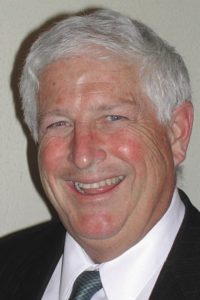Adam Hill is on strike, so suspend his paycheck
February 3, 2017

Mike Brown
OPINION by MIKE BROWN
Adam Hill is unhappy. He feels he is entitled to certain outside agency board and committee appointments that he had held for the past eight years.
He wants to perpetually serve on the Board of the Economic Vitality Corporation (EVC) and as the alternate on the boards of both the Local Agency Formation Commission (LAFCO) and the California State Association of Counties Board of Directors.
His buddy Bruce Gibson, feigning his usual outrage, was also removed from assignments that he had monopolized for 10 years.
Even though he casts himself as “Mr. Social Justice,” defender of the poor, homeless, and aged, Hill is not interested in serving on the Adult Services Policy Council, Community Action Partnership of San Luis Obispo (CAPSLO), Homeless Services Oversight Council, Latino Outreach Council, or Psychiatric Health Facility Committee.
Not so accidentally, it has been Supervisor Debbie Arnold who has labored on most of these jobs for the past four years. She was assigned without ever being asked and has served admirably. These are time consuming and demanding committees and organizational board appointments.
Perhaps Hill and Gibson think these are “girl” assignments and that they are entitled to the more visible and prestigious “he-man” public policy appointments.
Now it turns out that Hill, who did not receive his first choices, is retaliating by refusing to serve in any of the assignments whatsoever. That’s right, he is on strike.
From time to time, the more disturbed and egocentric politicians will resort to such theatrics. The ploy reminds me of a City of Hartford, Connecticut City Councilman who some years ago fell out with the City Council majority of which he was actually a member. They kicked him out of their caucus (no Brown Act in Connecticut). 
In “protest” he moved his desk outside the City Council offices and into the hall, which was actually on a very visible balcony in a huge atrium. There he sat day after day in glorious isolation, his desk partially blocking the balcony (actually next to the bench on the left side in the photo). The stunt was staged to call attention to his effort to disrupt the City Council majority. When he refused to move, the Treasurer started holding up his paychecks.
Hill seems to be following the same script.
The Board of Supervisors has set up a variety of subject specific advisory boards and committees to assist it in determining needs, potential service improvements, funding strategies, policies, and ordinances. Serving on some of these bodies is included in the normal duties of each supervisor. Currently there are several vacancies that have no board member representative.
As part of his “job action” Hill is refusing to serve on any, unless perhaps he thinks he can negotiate his way back to his first choices.
The board should simply appoint him to the bodies that have unclaimed vacancies. Under the State Statutes governing boards of supervisors, each board has broad powers to operate. This would include making its member assignments.
California Government Code, Section 25003: The board may make and enforce rules and regulations necessary for the government of the board, the preservation of order, and the transaction of business.
A subsequent section of the statute, 25042, prohibits county supervisors from neglecting or refusing to perform the duties imposed upon them:
“Any supervisor who (a) refuses or neglects to perform any duty imposed on him, without just cause, or (b) wilfully violates any law provided for his government as a supervisor, or (c) fraudulently or corruptly performs any duty imposed on him, or (d) wilfully, fraudulently, or corruptly attempts to perform an act as supervisor which is unauthorized by law, in addition to any other penalty prescribed by law, forfeits to the county five hundred dollars ($500) for every such act, to be recovered on his official bond, and is further liable on his official bond to any person injured thereby for all damages sustained.”
If Hill should refuse the board-imposed assignments, and as the statute requires, he would be “neglecting a duty imposed upon him without just cause.” He is not refusing to attend the meetings of these bodies for just cause, such as being ill or even overworked. It is simply a form of political maneuvering.
In addition to the remedies imposed in the statute, the auditor controller should sequester his bi-weekly paycheck. After all, a county employee who refuses to perform a portion of his or her duties would be first warned and then dismissed. Why should the elected supervisors be treated any differently?
In the larger picture, Hill partially blames COLAB for the change in assignments. He and Supervisor Gibson assert that COLAB is somehow directing the new board majority. Both Gibson and Hill, in defense of their zealotry, miss the point. COLAB is a government watchdog that supports more limited government, less taxation, economic growth, and freedom. We judge policies and programs on the basis of how they conform to or deviate from these principles.
The fact that someone elected to the Board of Supervisors may adhere to similar criteria for evaluating policy does not make them running dogs of COLAB or anyone else. Hill’s and Gibson’s superficial and unsubstantiated allegations in this case are insultingly belittling of their colleagues and their colleagues’ constituents. That Hill and Gibson have falsely proclaimed such a lie, demonstrates their own desperation and fear.
These personal attacks themselves demonstrate why they are unfit to be Chairmen of the Board of Supervisors, LAFCO members, CSAC reps, and EVC Board members.
Mike Brown is the Government Affairs Director of the Coalition of Labor Agriculture and Business (COLAB) of San Luis Obispo County. He had a 42 year career as a city manager and county executive officer in four states including California. He can be reached at mike@colabslo.org.






The comments below represent the opinion of the writer and do not represent the views or policies of CalCoastNews.com. Please address the Policies, events and arguments, not the person. Constructive debate is good; mockery, taunting, and name calling is not. Comment Guidelines